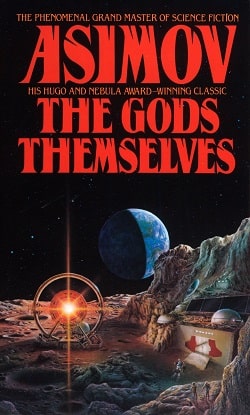Summary

The Gods Themselves
by Isaac Asimov
In the twenty-second century Earth obtains limitless, free energy from a source science little understands: an exchange between Earth and a parallel universe, using a process devised by the aliens. But even free energy has a price. The transference process itself will eventually lead to the destruction of the Earth's Sun--and of Earth itself.
Only a few know the terrifying truth--an outcast Earth scientist, a rebellious alien inhabitant of a dying planet, a lunar-born human intuitionist who senses the imminent annihilation of the Sun. They know the truth--but who will listen? They have foreseen the cost of abundant energy--but who will believe? These few beings, human and alien, hold the key to the Earth's survival.
.
Read
The Gods Themselves on http://kissnovel.net
Martial Peak Reviews
The Gods Themselves by Isaac Asimov is a masterful exploration of the interplay between science, ethics, and the consequences of human ambition. Published in 1972, this Hugo and Nebula Award-winning novel remains a significant work in the science fiction genre, not only for its imaginative premise but also for its profound thematic depth and character development. Asimov crafts a narrative that is as intellectually stimulating as it is emotionally engaging, making it a timeless read for both science fiction enthusiasts and casual readers alike.
The story unfolds in the twenty-second century, where Earth has discovered a method to harness limitless energy through a process involving a parallel universe. This energy source, however, comes with a dire cost: the eventual destruction of the Sun and, consequently, Earth itself. Asimov introduces us to a diverse cast of characters who are aware of this impending doom, including an outcast Earth scientist, a rebellious alien from a dying planet, and a lunar-born human intuitionist. These characters serve as the narrative's backbone, each representing different perspectives on knowledge, belief, and the human condition.
One of the most compelling aspects of The Gods Themselves is its exploration of scientific ethics. The novel raises critical questions about the responsibilities of scientists and the moral implications of their discoveries. The characters grapple with the knowledge that their pursuit of energy could lead to catastrophic consequences, yet they are met with skepticism and disbelief from society. This theme resonates strongly in today's context, where technological advancements often outpace ethical considerations. Asimov's portrayal of the struggle between progress and responsibility serves as a cautionary tale, urging readers to reflect on the potential ramifications of unchecked scientific exploration.
Asimov's character development is another standout feature of the novel. The three main characters—Dr. Peter Lamont, the alien Dua, and the intuitionist Odeen—are intricately crafted, each embodying distinct traits and motivations. Dr. Lamont represents the archetypal scientist, driven by a thirst for knowledge but ultimately conflicted by the consequences of his work. Dua, an alien from the parallel universe, offers a unique perspective on survival and adaptation, challenging human notions of morality and existence. Odeen, with his intuitive abilities, serves as a bridge between the two worlds, highlighting the importance of emotional intelligence in understanding complex issues. Through these characters, Asimov delves into the complexities of human nature, illustrating how fear, ambition, and the desire for survival can lead to both innovation and destruction.
The novel's structure is also noteworthy, as it is divided into three distinct parts, each focusing on different characters and settings. This tripartite narrative allows Asimov to explore various themes and perspectives, creating a rich tapestry of ideas that interweave throughout the story. The first part introduces the scientific community's blind pursuit of energy, while the second part shifts to the alien world, providing insight into the motivations and struggles of its inhabitants. The final part brings the narrative full circle, as the characters converge to confront the impending crisis. This structure not only enhances the pacing of the story but also emphasizes the interconnectedness of all beings, human and alien alike.
Asimov's prose is both accessible and thought-provoking, striking a balance between scientific exposition and engaging storytelling. He deftly weaves complex scientific concepts into the narrative without alienating readers, making the novel a compelling read for those unfamiliar with the intricacies of physics. The dialogue is sharp and often laced with humor, providing moments of levity amidst the weighty themes. Asimov's ability to blend intellectual rigor with emotional depth is a testament to his skill as a writer, ensuring that the novel resonates on multiple levels.
In terms of its overall impact, The Gods Themselves stands as a significant contribution to the science fiction canon. It challenges readers to consider the ethical implications of scientific advancement and the responsibilities that come with knowledge. The novel's exploration of parallel universes and the nature of existence invites comparisons to other works in the genre, such as Philip K. Dick's The Man in the High Castle and Ursula K. Le Guin's The Dispossessed, both of which also delve into themes of reality, morality, and the human experience. However, Asimov's unique blend of optimism and caution sets his work apart, offering a vision of humanity that is both hopeful and sobering.
In conclusion, The Gods Themselves is a profound and thought-provoking novel that remains relevant in today's world. Its exploration of scientific ethics, character development, and the consequences of human ambition make it a must-read for anyone interested in the complexities of existence. Asimov's ability to weave intricate narratives with deep philosophical questions ensures that this book will continue to inspire and challenge readers for generations to come. Whether you are a long-time fan of science fiction or a newcomer to the genre, The Gods Themselves is a compelling journey that will leave you contemplating the delicate balance between progress and responsibility.






![The Countdown of My Death is Spamming My Status Window [Official]](/upload/pic/manga/the-countdown-of-my-death-is-spamming-my-status-window--official-.jpg)

















Reviews 0
Post a Reviews: